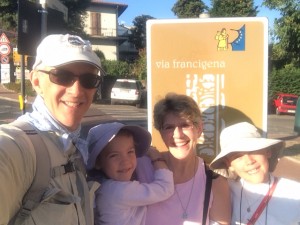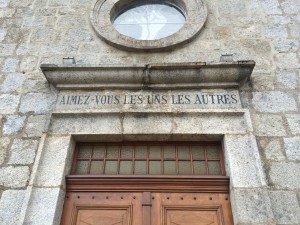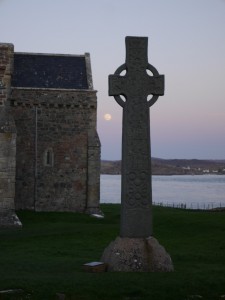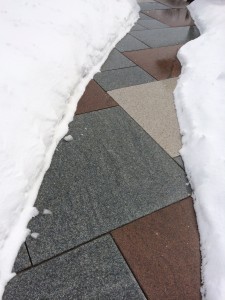Our congregation’s final Sabbatical Celebration took place in the Lodge of nearby Camp Long on Sunday August 24. The day started with worship, followed by a potluck meal and sharing both from the Kindem family and the several members of the congregation.
Worship was centered around the theme of pilgrimage. The liturgical frame included songs and dialogs we’d experienced with the Iona Community, and was interspersed with Scripture readings and complementary stories from our travels. I’ve included the reading citations and stories below. (To get the most out of this, I recommend that you look up and read the Bible passage before reading the accompanying commentary or story.)
FIRST READING: Genesis 12:1-4a
Now the Lord said to Abram, “Go from your country and your kindred and your father’s house to the land that I will show you. I will make of you a great nation, and I will bless you, and make your name great, so that you will be a blessing. I will bless those who bless you, and the one who curses you I will curse; and in you all the families of the earth shall be blessed.” So Abram went, as the Lord had told him.
STORY #1 – Pilgrimage
God called…and Abram went. Thomas Cahill calls those two words—ABRAM WENT—two of the boldest words in all literature. Abram and Sarah left the settled life they’d always known and struck out for the unknown, believing that God would lead them there.
Well, the Lilly Foundation called, and the Kindems went! Four months, six countries, 20,000 miles. We traveled by plane, train, car, ferry, bus, taxi, bicycle, gondola, horse, and on foot.
The list of the necessities for our journey was a bit longer, I’m sure, than Abram and Sarah’s list. And unlike their journey, ours had us traveling to parts of the world that are well known rather than unknown. Armed with smart phones, laptop, and a detailed list of places we’d be staying and people we’d be seeing—our trip was a far cry from Abram and Sarah setting off into the unknown.
Yet still our itinerary took us to places new to us. And like Abram and Sarah we had faith that God would travel with us along the way.
As we began dreaming about what this experience might look like, the language we started to use was the language of pilgrimage. Our family’s pilgrimage would have geographical dimensions as well as spiritual ones, and include visits to places, people, and communities with whom we had a deep desire to connect. The congregation’s journey here at home, on the other hand, would be spiritual rather than geographical, but the sense of pilgrimage would still apply.
The language of pilgrimage has resonated deeply with people of faith through the ages.
- It starts with these opening verses from the 12th chapter of Genesis but it doesn’t stop there. It continues with the stories of Isaac, Jacob and Joseph.
- It moves forward with the story of Israel’s captivity in Egypt, and their liberation at the Red Sea and the 40 years of wandering the wilderness under the leadership of Moses.
- We see the journey motif appear again during the Babylonian exile and the eventual return home.
- The story of Jesus begins with his journey from heaven to earth, from the realm of the infinite to the confines of a young woman’s womb. The Eternal WORD goes on a sojourn, leaving heaven in order to be fully present in the flesh among us here. And Jesus himself, as his public ministry begins, is led by the Spirit on a 40-day pilgrimage into the wilderness among the wild beasts.
- The New Testament goes on to tell how St. Paul and other gospel witnesses were always on the move, journeying from place to place, sharing the message of how God was at work in Jesus of Nazareth, mending and healing this broken world through his life, death, and resurrection.
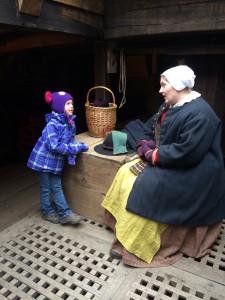 We began our sabbatical pilgrimage in New England, exploring the places and histories of those first European immigrants who came to these shores in search of the freedom to practice their faith without Old World constraints.
We began our sabbatical pilgrimage in New England, exploring the places and histories of those first European immigrants who came to these shores in search of the freedom to practice their faith without Old World constraints.
They were given the name “pilgrims.”
Being on our own pilgrim road put us in the company of them and of other pilgrims—both ancient and contemporary—whose journeys embraced both physical as well as spiritual dimensions.
God told Abram and Sarah to go, and they went. And in their going, the world was changed. Where is God calling you to go? Will your journey be geographical? Emotional? Spiritual?
SECOND READING: Psalm 121
Psalm 121 is one of a group of psalms in the Psalter known as Psalms of Ascent. Essentially, they are pilgrimage psalms, short and compact, that the faithful could recite as they made their way on foot to Jerusalem for festivals. This psalm affirms God’s protective presence all along the way.
I lift my eyes to the hills; from where will my help come?
My help comes from the Great God who made heaven and earth.
God will not let you fall: The One who watches over you is wide awake.
The Protector of God’s people never sleeps.
A God has you in safe keeping and stays by your side.
The sun shall not strike you by day, nor the moon harm you by night.
God will protect you from all evil and will cherish your life.
God will keep watch over your going out and your coming in, now and forever.
STORY #2 – Life Given Back
When you’re on a long journey, things happen that you didn’t anticipate, that you hadn’t planned for; sometimes for good, sometimes for bad.
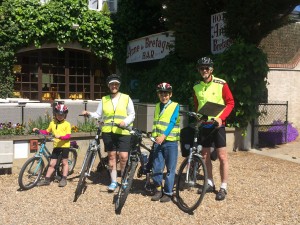 The self-guided bicycle tour in France’s Loire Valley was an activity each one of us anticipated eagerly. Beginning in the town of Blois, our route took us along rural roads, through vineyards and French villages, and past great Chateaus built by French royalty in centuries gone by.
The self-guided bicycle tour in France’s Loire Valley was an activity each one of us anticipated eagerly. Beginning in the town of Blois, our route took us along rural roads, through vineyards and French villages, and past great Chateaus built by French royalty in centuries gone by.
Our luggage was transported for us from one destination to the next, so it was ready and waiting—along with a dinner voucher—when we arrived at day’s end. What’s not to like?
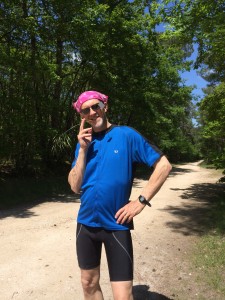 Day 2 of our journey began in the village of Bracieux. It was a beautiful spring day as we followed the route laid out for us in our written guide, and things were going quite well until we reached a fork in the road that was not on our map. Which way to turn? I was convinced we ought to go left.
Day 2 of our journey began in the village of Bracieux. It was a beautiful spring day as we followed the route laid out for us in our written guide, and things were going quite well until we reached a fork in the road that was not on our map. Which way to turn? I was convinced we ought to go left.
An hour or so later, after trekking for what seemed like miles through an increasingly narrow, wet and muddy forest path, we finally emerged on the other side of the forest, only to find that the decision we’d made (OK, I had made…) back at the fork, had taken us a score of kilometers in the wrong direction.
So when we finally arrived at the outskirts of our destination, Coeur Cheverny, after riding nearly double the distance we’d anticipated riding that day, our crew was road weary and a wee bit grumpy.
Crossing a busy road on foot, we walked to the first stoplight we’d seen that day and waited to cross. When the light turned green, Kai and I pedaled across, leaving Chris and Naomi to follow. What happened next comes straight out of the catalog of parents’ worst nightmares…
The huge truck that came up from behind Chris and Naomi seemed to materialize out of nowhere.
Naomi had started pedaling across the intersection with Chris soon to follow when the truck driver—high in his cab and oblivious to the little girl on a bicycle in the crosswalk—initiated a right turn, putting him on a collision course with Naomi.
There was no time to act. All Chris could do was scream.
When I heard the scream, I was waiting with Kai 100 ft past the intersection.
Turning back I saw this huge truck stopped dead in the intersection, halfway through the turn, with Naomi and Chris nowhere in view. Throwing down my bike, I sprinted back to the scene and started shaking my fist and yelling at the thoroughly bewildered truck driver like a madman!
But there, on the other side of the truck, on the sidewalk wrapped in Chris’s arms, was our daughter completely unscathed. Other than being totally embarrassed by her parents’ outbursts of anger and tears she was OK.
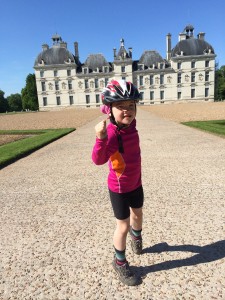 You see, when she heard that truck come alongside her, and saw his wheel turning toward her, Naomi turned too—turned like a pro, right off the street, onto the sidewalk, and out of harms way.
You see, when she heard that truck come alongside her, and saw his wheel turning toward her, Naomi turned too—turned like a pro, right off the street, onto the sidewalk, and out of harms way.
GOD HAS YOU IN SAFE KEEPING, sings the Psalmist, AND STAYS BY YOUR SIDE. GOD WILL PROTECT YOU AND CHERISH YOUR LIFE.
PSALMODY Eagle’s Wings ELW #787
THIRD READING: Exodus 17:1-7
From the wilderness of Sin the whole congregation of the Israelites journeyed by stages, as the Lord commanded. They camped at Rephidim, but there was no water for the people to drink. The people quarreled with Moses, and said, “Give us water to drink.” Moses said to them, “Why do you quarrel with me? Why do you test the Lord?” But the people thirsted there for water; and the people complained against Moses and said, “Why did you bring us out of Egypt, to kill us and our children and livestock with thirst?” So Moses cried out to the Lord, “What shall I do with this people? They are almost ready to stone me.” The Lord said to Moses, “Go on ahead of the people, and take some of the elders of Israel with you; take in your hand the staff with which you struck the Nile, and go. I will be standing there in front of you on the rock at Horeb. Strike the rock, and water will come out of it, so that the people may drink.” Moses did so, in the sight of the elders of Israel. He called the place Massah and Meribah, because the Israelites quarreled and tested the Lord, saying, “Is the Lord among us or not?”STORY #3 – The Lord Provides
We’d rented a car for our journey from the Loire Valley to a small village in the Vivarais Plateau region of south central France called Le Chambon sur Lignon. If you read our blog you know why we were going to this small out of the way place.
Over the course of World War 2, the Christian inhabitants of this region sheltered thousands of Jewish men, women, and children in direct opposition to the orders of the French Vichy government and Nazi occupation forces, for the duration of the war.
Led by Pastors Andre Trocmé and Edward Theis, the people of Le Chambon and surrounding farms and villages fought the forces of violence and evil with the weapons of the spirit. I wanted my family to experience this place.
The trip to Le Chambon from Blois would take, we figured, about five hours. But wanting to take in just one more sight before we left the Loire Valley slowed our departure until mid-afternoon.
We drove on, making the best time we could, but found ourselves leaving the main highway and entering the mountains just at sunset. The road signs were less than helpful, the roundabouts confusing, the kids were growing hungry, and our goal seemed to slip further away each moment.
After taking a wrong turn and then back tracking for the second or third time, we finally had to admit that we were lost. THE NEXT TIME YOU SEE A HUMAN BEING—Chris said—STOP!
It seemed unlikely we’d run into anyone on what seemed like a road to nowhere, but then, around the corner and across the way we spotted him: a man fueling his delivery truck. I pulled over and Chris got out to explain our situation the best she could in French, and before long, the man had drawn up a map of sorts on a scrap of paper, detailing the turns we’d need to make at key points in order to thread our way up through the rugged hills to Le Chambon. Thank you God.
That map became our Bible and we became literalists! Following every mark he’d made, we slowly winded our way up and up through the increasing darkness.
By now it was after nine pm on a Sunday. We hadn’t had dinner, there was no restaurant within miles, and the food we’d brought along was nearly consumed. The kids were at their wits end. I’M HUNGRY! WHEN WILL WE GET THERE! WHY’D WE COME HERE! I WANT SOME FOOD! On and on it went, rising and falling. You get the picture.
I felt like Moses, about to be stoned.
When we finally arrived in Le Chambon it was 11pm and everything was locked up tight, but by the mercy of God we found our hotel just out of town. As we pulled up to the curb the weeping and gnashing of teeth in the back seat reached epic proportions. They were done.
Everything looked dark. Did the hotel remember that the Kindems were supposed to spend the night? Please Lord, let it be so! Chris got out to see.
Running to the door she looked inside and saw a light on; she reached for the door handle—it opened! And there at the deserted front desk was a room key with our name: Kindem. Thank you God. We bundled the kids up to the room, turned on the TV for distraction purposes, and after bringing in the luggage, I turned my attention to finding food.
This is supposed to be a bed and breakfast, I thought, there’s got to be a kitchen around here somewhere!
I tried a door off the lobby…it opened! And low and behold, it was the door to the hotel’s dining room and kitchen. With the lights off, I felt my way around and stumbled upon some breakfast cereal in a dispenser.
I filled up three bowls and brought them upstairs to the room to Chris and the kids. And let me just say: No hunter gatherer ever felt prouder than I did at that moment!
But we needed milk, and so I returned to the darkened kitchen to continue my search. And as I’m scrounging around in there the thought enters my mind—what if someone finds me in here and thinks I’m a thief?!
Seconds later I hear the door open and a voice calls out:
QUI EST LA?—Who’s there?
On goes the light and I find myself, bowl in hand, face to face with the hotel caretaker, who’s just returned to the hotel with his girlfriend.
I tried to explain the best I could what I, a complete stranger, was doing in the darkened kitchen steeling cereal for my starving children, and, fortunately, his English was better than my French.
His response? WOULD YOU LIKE SOME MILK?
When I arrive back at our room a few minutes later, milk in hand, I am greeted like a conquering hero. Yes, thanks be to God, we have survived! Already the legendary hospitality of Le Chambon, this community which had served as a safe haven for outsiders during critical moments in the 20th century, had proven itself.
To the question, IS THE LORD AMONG US OR NOT? The unequivocal answer that night was YES.
FOURTH READING: Hebrews 11:1, 29-12:2
Now faith is the assurance of things hoped for, the conviction of things not seen. By faith the people passed through the Red Sea as if it were dry land, but when the Egyptians attempted to do so they were drowned. By faith the walls of Jericho fell after they had been encircled for seven days. By faith Rahab the prostitute did not perish with those who were disobedient, because she had received the spies in peace. And what more should I say? For time would fail me to tell of Gideon, Barak, Samson, Jephthah, of David and Samuel and the prophets— who through faith conquered kingdoms, administered justice, obtained promises, shut the mouths of lions, quenched raging fire, escaped the edge of the sword, won strength out of weakness, became mighty in war, put foreign armies to flight. Women received their dead by resurrection. Others were tortured, refusing to accept release, in order to obtain a better resurrection. Others suffered mocking and flogging, and even chains and imprisonment. They were stoned to death, they were sawn in two, they were killed by the sword; they went about in skins of sheep and goats, destitute, persecuted, tormented— of whom the world was not worthy. They wandered in deserts and mountains, and in caves and holes in the ground. Yet all these, though they were commended for their faith, did not receive what was promised, since God had provided something better so that they would not, apart from us, be made perfect. Therefore, since we are surrounded by so great a cloud of witnesses, let us also lay aside every weight and the sin that clings so closely, and let us run with perseverance the race that is set before us, looking to Jesus the pioneer and perfecter of our faith, who for the sake of the joy that was set before him endured the cross, disregarding its shame, and has taken his seat at the right hand of the throne of God.STORY #4 – Celtic Saints
One of the things that left the deepest impressions on us was the lives of the Celtic saints we came to learn about during what we call our Celtic pilgrimage from Ireland to Iona, to Lindisfarne to Durham—St. Patrick, St. Kevin, St. Bridget, St. Columba, St. Aiden, St. Cuthbert among them.
Their passionate devotion to God; their willingness to endure all manner of trials and challenges to bring the light of Christ to people who’d never known it; their spiritual stamina and physical fortitude; their artistic sensibility; their recognition that God was imminently present in the natural world; their comfort in dealing with kings and chieftains as well as the common folk; their humility…the list goes on.
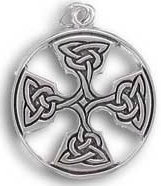 St. Patrick is probably the best known of that group. The story of how he was kidnapped and brought to Ireland as a slave, and after six years escaped, and later returned to Ireland to become the founding father of the Irish Church, reads like a best selling novel.
St. Patrick is probably the best known of that group. The story of how he was kidnapped and brought to Ireland as a slave, and after six years escaped, and later returned to Ireland to become the founding father of the Irish Church, reads like a best selling novel.
But it is the way Celtic Christianity developed during and after Patrick through a network of largely independent monasteries scattered through the rural landscape of Ireland and then Scotland and then northern England, which is truly remarkable.
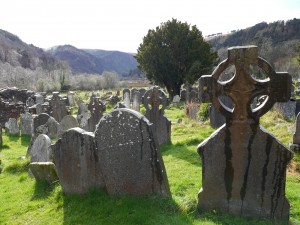 John Cahill tells that story in his book HOW THE IRISH SAVED CIVILIZATION.
John Cahill tells that story in his book HOW THE IRISH SAVED CIVILIZATION.
These monasteries, including the one we visited at Glendalough, Ireland, established by St. Kevin, the one founded by St. Columba on Iona, and the one established by St. Aiden on Lindisfarne, were centers of community, centers of mission and centers of scholarship.
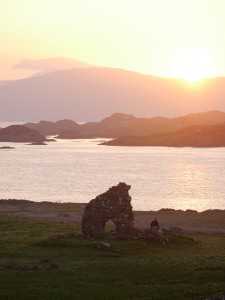
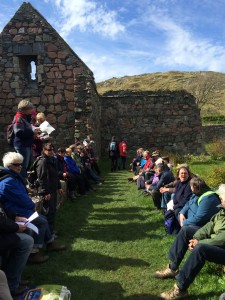 The monks found meaning, purpose, and direction by following a rule of life. And when we were on Iona, where Columba (or Colum Cille as he’s called there) founded a monastic community in 563, we got to see first hand how 21st century Christians inspired by a 6th century saint and committed likewise to a rule of life, were bringing new vitality to the church.
The monks found meaning, purpose, and direction by following a rule of life. And when we were on Iona, where Columba (or Colum Cille as he’s called there) founded a monastic community in 563, we got to see first hand how 21st century Christians inspired by a 6th century saint and committed likewise to a rule of life, were bringing new vitality to the church.
GOSPEL READING: Matthew 16:13-20
Now when Jesus came into the district of Caesarea Philippi, he asked his disciples, “Who do people say that the Son of Man is?” And they said, “Some say John the Baptist, but others Elijah, and still others Jeremiah or one of the prophets.” He said to them, “But who do you say that I am?” Simon Peter answered, “You are the Messiah, the Son of the living God.” And Jesus answered him, “Blessed are you, Simon son of Jonah! For flesh and blood has not revealed this to you, but my Father in heaven. And I tell you, you are Peter, and on this rock I will build my church, and the gates of Hades will not prevail against it. I will give you the keys of the kingdom of heaven, and whatever you bind on earth will be bound in heaven, and whatever you loose on earth will be loosed in heaven.” Then he sternly ordered the disciples not to tell anyone that he was the Messiah.STORY #5 – Who do you say that I am?
All along the way during our sabbatical, we encountered different answers to this question Jesus posed to his followers.
At Weston Abbey in Vermont, the Benedictine Brothers showed me a Christ who is made known within a compassionate community dedicated to a simple lifestyle of loving service, justice, and joy.
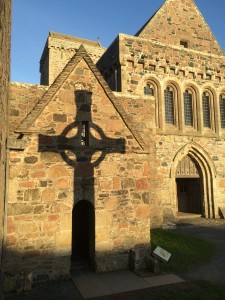 At Iona we met a Christ who, rooted in ancient Celtic love of music and verse, calls us into a community of mutual accountability and a way of loving God that leads to engagement with the thorniest issues facing our world.
At Iona we met a Christ who, rooted in ancient Celtic love of music and verse, calls us into a community of mutual accountability and a way of loving God that leads to engagement with the thorniest issues facing our world.
At Le Chambon we met a Christ who comes to us in the guise of the vulnerable neighbor, seeking refuge.
In Florence it was Christ the Pantocrator and Great Judge, to whom we must ultimately give account for our lives.
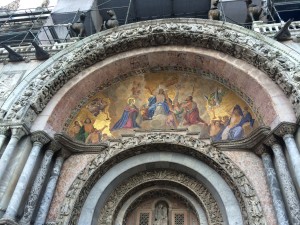 In Venice the Christ we met seemed frozen in a past age; a precious museum piece from a long ago time, beautifully gilded but remotely inaccessible.
In Venice the Christ we met seemed frozen in a past age; a precious museum piece from a long ago time, beautifully gilded but remotely inaccessible.
And in Rome we met a Christ who suffered the depths of what evil and corrupt humanity could dish out, and still suffers as the church who claims him as Lord vacillates between resorting to tactics of Empire and serving the lost and the least with humility.
Over the last 2 millennia, Christians have answered his question WHO DO YOU SAY THAT I AM in an extraordinary variety of ways.
When Peter gave his answer, Christ congratulated him; but a few short verses later, it becomes clear that Peter himself really didn’t know what being THE MESSIAH, THE SON OF THE LIVING GOD truly meant.
You’d think that after 2000 years the question would be settled! But it’s not.
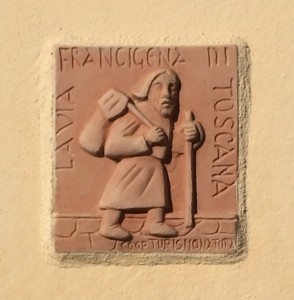 We still need to ask it in every age, in every context. And to ask, too, what claims the answer will make on our lives.
We still need to ask it in every age, in every context. And to ask, too, what claims the answer will make on our lives.
Will it settle things? Or will it perhaps make us restless?
Restless to go on yet another journey?

